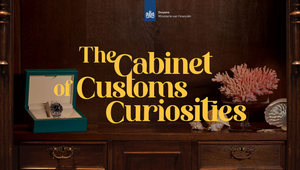
Wellbeing Isn't a Strategy, It's Culture

Last week my grandfather passed away. He was 95, and lived an incredible life, growing up the child of immigrants in the East End, (around the corner from our London Media.Monks office) to realising his entrepreneurial dreams and owning a camping shop in the heart of London’s West End, serving royalty and celebrities. More poignantly, my Grandfather’s proudest success was his family, having amassed three sons, eight grandchildren, and six great grandchildren.
In Judaism, when someone passes away, you bury the body immediately, and then commence a week of Shiva, the seven-day period where people visit the mourners throughout the week to talk of memories, stories, and (of course) eat. The mourners aren’t allowed to work, shop, cook, clean or even look at themselves in the mirror. Why? They must focus on grieving, an elongated exposure of raw and uninterrupted emotions - an intense period of reflection with continuous support from friends, family and the wider community.
This experience has heightened my awareness of individual wellbeing, which is so much more than a day or week of awareness each year. Wellbeing done right is embedded into a business, it’s a culture rather than a strategy. It’s not about self care during the highs and lows, it’s about everyday care, ensuring that each individual employee in the business is having their wellbeing needs met, continuously, without condition. A wellbeing culture comes from passionate people within a company, and a successful wellbeing culture builds sufficient awareness from peers as well as from management, spreading the wellbeing spirit and culture, and getting more and more people involved, participating and engaging.
As well as peer initiatives, wellbeing culture needs to come from leadership - those within each agency that not only talk about wellbeing, but actually live wellbeing principles like flexible working and finishing on time, in order to prevent burnout and ensure balanced work-lives. With a framework from leadership, together with authenticity, a wellbeing culture is created, cultivated and moulded by those across every level of a business, ensuring that each unique employee can tailor their own work life culture. How each workplace actions this is different, but it should be a continuous emphasis, and a focus across the company. We all know that a good culture (in advertising) is hard to find, and when you do find it, you want to stay and help to contribute to it.
Each employee has different and unique needs - something myself and my colleagues have explored over the past few years, founding the Wellbeing.Monks, a peer initiative intent on creating the best, most inclusive agency atmosphere, something which a fair few of us have never experienced before. How have we done this? From catering to different needs and personalities, through safe space sessions with psychologists, to yoga on our roof terrace. From examining neurodiversity in the workforce to training Mental Health First Aiders, and even dog therapy as an alternative mental health therapy - we have looked at countless ways to support our colleagues. Some have worked, some haven’t, and just like our work, we test our wellbeing initiatives too. We’ve trialled and subsequently scrapped intense, week-long programmes in favour of always-on sessions and events, and have listened to and implemented feedback every step of the way.
Of course - I’m not saying that our company is without the issues that many agencies and corporate companies face; we have the pains that come from growing quickly in such a short time, but we do have a space where people feel able to authentically share their experience through individual stories, voices of those that speak out - as well as those with quiet strength. It's easy to measure the happiness of employees through the vocal, outspoken individuals. But wellbeing isn't as obvious as a broken arm. We can't see it, so we have to accept that there will be unknowns when trying to cater to the many, and give as many chances for honest feedback to make the best employee experience possible.
Success is difficult to measure without immediate results and impact. I believe the key to great wellbeing culture is the implementation of robust resources, processes and initiatives that are regularly updated and measured. It can be counter productive to push a rigid schedule of learning, especially for our hectic, triple-booked agency calendars. There will be many who may seem like they aren’t listening, not asking questions, not engaging, or not making eye contact. Those who turn up but seem disconnected because they’re doodling (yes that was me, and actually I am listening more intently than you think!), don’t feel the need to speak up in every single meeting, those that seem 'quieter' than the typical extrovert ‘ad-agency-bro’. We must remember that everyone processes information differently, and include those with neurodiverse brains.
So here’s my challenge to everyone reading this, from CEO’s to interns - help change the culture of our industry, the way we work, and live our lives. Like my grandfather, may we all make it to 95, with only exciting, hopeful and inspirational stories to tell about our lives, within and outside of work.
Make flexibility differences acceptable. Embed a good, purposeful culture beyond work. Call out the bad behaviour. Reward the good. Give your employees benefits that are of value to them as individuals, listen to what they say and action it. Culture is something we build together: individually, within the companies we work for, and eventually together with our entire industry.















